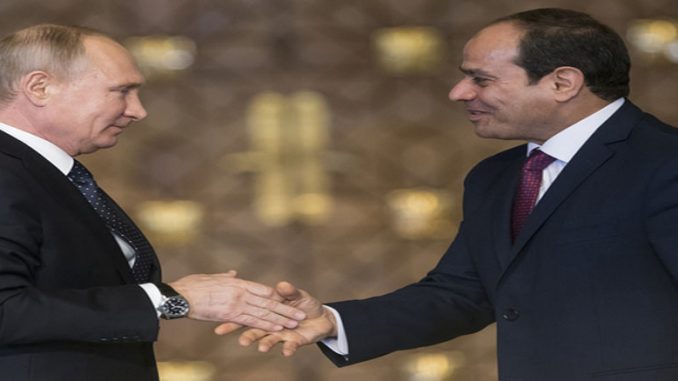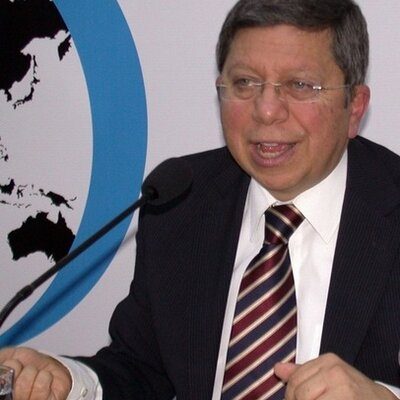
Russian President Vladimir Putin sent a message of appreciation to Egypt when he received the credentials of new foreign ambassadors in Moscow, including the new Egyptian ambassador to Russia, Nazih al-Nagari, reported Egypt Independent, an Egyptian news website.
Citing Russia Today news website, Egypt Independent stated that the Russian President said that Russia considers Egypt one of its most important partners in Africa and the Arab world, while he was speaking with the new ambassadors, including Egypt’s new ambassador to Moscow.
Putin explained that friendly relations with Egypt are gradually being built in accordance with the comprehensive partnership and strategic cooperation agreement signed in 2018, as we consider this country one of our most important partners in Africa and the Arab world.
“We are in constant contact with Egypt’s Abdel Fattah al-Sisi, and the joint government committee is actively working and contributing to increasing the volume of mutual trade, which increased by more than 40% in the first half of this year,” he continued.
The Russian president also indicated that large-scale joint projects are being implemented in Egypt, such as the construction of Al-Dabaa nuclear power plant and the establishment of the Russian industrial zone in the Suez Canal region, noting that there are regular political dialogue and close coordination in the field of foreign policy.
“I would like to remind you, in the presence of the distinguished ambassadors of Algeria and Egypt, as well as their colleagues from other African countries, that the second Russia-Africa Summit is scheduled to be held in Saint Petersburg in 2023. We hope that together we can give a new impetus to the comprehensive development of mutually beneficial cooperation between Russia and African countries,” he said.
During a visit to the headquarters of Russian Today channel in Moscow, the new Egyptian ambassador to Moscow also emphasized the role of “the well-established historical relations between Moscow and Cairo”, emphasizing his country’s keenness to establish balanced relations with all countries of the world for the common interest.
It was agreed during the visit to activate joint cooperation, especially in preparation for the 80th jubilee of establishing diplomatic relations between Cairo and Moscow.
Egypt has been an important partner in the Middle East for the United States since 1979, when it broke with its Arab neighbors to sign a peace treaty with Israel. Successive U.S. administrations have seen Egypt, with its strategic location on Israel’s borders and its control of the Suez Canal, as key to maintaining stability and combating terrorism in the region.
The U.S. government has given Egypt billions of dollars in aid, rarely wavering until this year, when the Biden administration withheld $130 million over concerns about the Sisi regime’s human rights record.
But Egypt was friendly with Russia long before its relations with the U.S. warmed, and still maintains significant ties: Russia supplied nearly 30 percent of Egypt’s tourists and much of its imported wheat before the war, and Russia is building a $26 billion nuclear power plant in Egypt. Ever since Russia invaded Ukraine, Mr. al-Sisi has tried to balance both relationships, refusing to condemn Russia’s actions as strongly as the U.S. had asked.
Though Egypt voted in March for a United Nations resolution against the Russian invasion of Ukraine under American pressure, it has also hedged its rhetoric about the war, Al-Sisi called Mr. Putin to reaffirm Egypt’s commitment to cooperation soon after the U.N. vote, and Egypt later attended the St. Petersburg forum.
In a speech a week later, Al-Sisi referred to the invasion as the “Russia-Ukraine crisis,” pointedly refraining from singling Russia out, and said that Egypt prioritized “the language of dialogue and peaceful solutions.”
According to the New York Times, the Egyptian public opinion also skews toward Russia. Many Egyptians, the NYT states, are happy to see Russia challenging the United States and its allies, drawing on deep lingering resentment over the American invasion of Iraq and the West’s support of Israel in its conflict with the Palestinians.
The Egyptian fence-straddling has not gone unnoticed by the U.S., which has in the past signaled displeasure about Egypt’s closeness to Russia, and once threatened to impose sanctions over Egyptian deals to buy Russian aircraft. But it was unclear on Friday whether the U.S. had exerted pressure on Sisi not to speak at the St. Petersburg forum.
From Egypt’s perspective, it cannot afford to alienate either country, especially at a time when Egypt’s economy has been buckling under the stress of inflation, foreign investment pulling out and wheat supplies drying up, according to the American daily.



